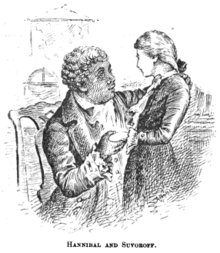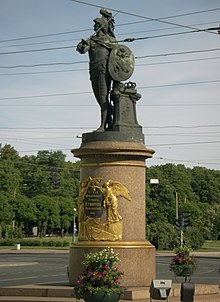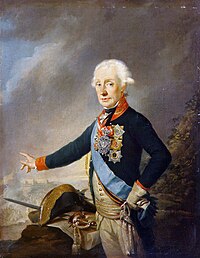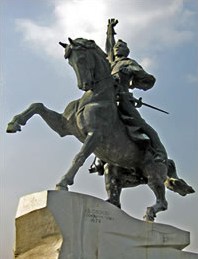Alexander Suvorov
Alexander Vasilyevich Suvorov (Алекса́ндр Васи́льевич Суво́ров, r Aleksandr Vasil‘evich Suvorov; 24 November [O.S. 13 November] 1729 or 1730 – 18 May [O.S. 6 May] 1800), Count Suvorov of Rymnik (граф Рымникский), Prince of Italy (князь Италийский), Count of the Holy Roman Empire, was a Generalissimo of the Russian Empire.
Suvorov is sometimes considered to be one of the few generals in history who never lost a battle (63-0). He was famed for his military manual The Science of Victory and noted for several of his sayings, including "What is difficult in training will become easy in a battle", "The bullet is a mad thing; only the bayonet knows what it is about", and "Perish yourself but rescue your comrade!". He taught his soldiers to attack instantly and decisively: "Attack with the cold steel! Push hard with the bayonet!" He joked with the men, calling common soldiers 'brother', and shrewdly presented the results of detailed planning and careful strategy as the work of inspiration.[1]
Early life and career
Suvorov was born into a noble family originating from Novgorod . Some of his ancestors had emigrated from Sweden in 1622.[2] His father, Vasiliy Suvorov, was a general-in-chief and a senator in the Governing Senate, and was credited with translating Vauban's works into Russian.[2]

As a boy, Alexander (nicknamed Sasha or Sandy) was a sickly child and his father assumed he would work in civil service as an adult. However, he learned to read French, German, Polish, and Italian, and devoted himself to intense study of several military authors including Plutarch, Quintus Curtius, Cornelius Nepos, Julius Caesar, and Charles XII. He tried to overcome his physical ailments through rigorous exercise and exposure to hardship. His father, however, insisted that he was not fit for the military. When Alexander was 12, General Gannibal, who lived in the neighborhood, overheard his father complaining about Alexander, and asked to speak to the child. Gannibal was so impressed with the boy that he persuaded the father to allow him to pursue the career of his choice.[2] Suvorov entered the army in 1748 and served in the Semyonovsky Life Guard Regiment for six years. During this period he continued his studies attending classes at Cadet Corps of Land Forces. He gained his first battle experience fighting against the Prussians during the Seven Years' War (1756–1763). After repeatedly distinguishing himself in battle Suvorov became a colonel in 1762, aged around 33.
As battle-tested as he was, Suvorov next served in Poland during the Confederation of Bar, dispersed the Polish forces under Pułaski, captured Kraków (1768) paving the way for the first partition of Poland between Austria, Prussia and Russia,[3] and reached the rank of major-general.
The Russo-Turkish War of 1768–1774 saw his first successful campaigns against the Turks in 1773–1774, and particularly in the Battle of Kozluca, he laid the foundations of his reputation, becoming a lieutenant-general in 1774. His later earned victories against the Ottomans bolstered the morale of his soldiers who were outnumbered, usually. His astuteness in war was uncanny.
In 1774, Suvorov was dispatched to suppress the rebellion of Pugachev, who claimed to be the assassinated Tsar Peter III, but arrived at the scene only in time to conduct the first interrogation of the rebel leader, who had been betrayed by his fellow Cossacks and was eventually beheaded in Moscow.
Battles against the Ottoman Empire

From 1777 to 1783 Suvorov served in the Crimea and in the Caucasus, general of infantry in 1786, upon completion of his tour of duty there.
From 1787 to 1791 he again fought the Turks during the Russo-Turkish War of 1787–1792 and won many victories; he was wounded twice at Kinburn (1787), took part in the siege of Ochakov, and in 1789 won two great victories at Focşani and by the river Rymnik.
In both these battles an Austrian corps under Prince Josias of Saxe-Coburg participated, but at the battle of Rymnik Suvorov was in command of the whole allied forces.
For the latter victory, Catherine the Great made Suvorov a count with the name "Rymniksky" in addition to his own name, and the Emperor Joseph II made him a count of the Holy Roman Empire.
On 22 December 1790 Suvorov successfully stormed the reputedly impenetrable fortress of Ismail in Bessarabia. Turkish forces inside the fortress had the orders to stand their ground to the end and haughtily declined the Russian ultimatum. Their defeat was seen as a major catastrophe in the Ottoman empire, but in Russia it was glorified in the first national anthem, Let the thunder of victory sound!
Suvorov announced the capture of Ismail in 1791 to the Tsarina Catherine in a doggerel couplet. For all his bluff and bluster, Suvorov later told an English traveler [who?] that when the massacre was over he went back to his tent and wept.[4]
Battles against Polish uprising

Immediately after the peace with the Ottoman Empire was signed, Suvorov was again transferred to Poland, where he assumed the command of one of the corps and took part in the Battle of Maciejowice, in which he captured the Polish commander-in-chief Tadeusz Kościuszko. On November 4, 1794, Suvorov's forces stormed Warsaw and captured Praga, one of its boroughs.
The massacre of approximately 20,000 civilians in Praga[5] broke the spirits of the defenders and soon put an end to the Kościuszko Uprising. According to some sources [6] the massacre was the deed of Cossacks who were semi-independent and were not directly subordinate to Suvorov. The Russian general was supposedly trying to stop the massacre and even went to the extent of ordering the destruction of the bridge to Warsaw over the Vistula river [7] with the purpose of preventing the spread of violence to Warsaw from its suburb. Other historians dispute this,[8] but most sources make no reference to Suvorov either deliberately encouraging or attempting to prevent the massacre.[9] Suvorov nonetheless allowed his troops to loot the city for a much longer period than was usually accepted, which might have been seen by some, particularly the unruly Cossacks, as a green light to do whatever they wanted.[10]
Suvorov sent a report to his sovereign consisting of only three words: "Hurrah, Warsaw's ours!" (Ура, Варшава наша!). Catherine replied in two words: "Hurrah, Fieldmarshal!" (rus. Ура, фельдмаршал!—that is, awarding him this title). The newly appointed field marshal remained in Poland until 1795, when he returned to Saint Petersburg. But his sovereign and friend Catherine died in 1796, and her son and successor Paul I dismissed the veteran in disgrace.
Suvorov's Italian campaign

Suvorov spent the next few years in retirement on his estate Konchanskoye near Borovichi. He criticised the new military tactics and dress introduced by the emperor, and some of his caustic verse reached the ears of Paul. His conduct therefore came under surveillance and his correspondence with his wife, who had remained at Moscow—for his marriage relations had not been happy—was tampered with.
It is recorded that on Sundays he tolled the bell for church and sang among the rustics in the village choir. On week days he worked among them in a smock-frock. However, in February 1799 Paul summoned him to take the field again, this time against the French Revolutionary armies in Italy.
The campaign opened with a series of Suvorov's victories (Cassano d'Adda, Trebbia, and Novi). French troops were driven from Italy, save for a handful in the Maritime Alps and around Genoa. Suvorov himself gained the rank of "prince of the House of Savoy" from the king of Sardinia.


But the later events of the eventful year went uniformly against the Russians. General Korsakov's force was defeated by Masséna at Zürich. Betrayed by the Austrians, the old field marshal, seeking to make his way over the Swiss passes to the Upper Rhine, had to retreat to Vorarlberg, where the army, much shattered and almost destitute of horses and artillery, went into winter quarters. When Suvorov battled his way through the snow-capped Alps his army was checked but never defeated. For this marvel of strategic retreat, unheard of since the time of Hannibal, Suvorov became the fourth generalissimo of Russia.[citation needed] He was officially promised a military triumph in Russia but court intrigues led Emperor Paul to cancel the ceremony.
Early in 1800 Suvorov returned to Saint Petersburg. Paul refused to give him an audience, and, worn out and ill, the old veteran died a few days afterwards on 18 May 1800, at Saint Petersburg. Lord Whitworth, the British ambassador, and the poet Gavrila Derzhavin were the only persons of distinction present at the funeral.
Suvorov lies buried in the church of the Annunciation in the Alexander Nevsky Monastery, the simple inscription on his grave stating, according to his own direction, "Here lies Suvorov". But within a year of his death the tsar Alexander I erected a statue to his memory in the Field of Mars.
Progeny and titles

Suvorov's full name and titles (according to Russian pronunciation), ranks and awards are the following: Aleksandr Vasiliyevich Suvorov, Prince of Italy, Count of Rymnik, Count of the Holy Roman Empire, Prince of Sardinia, Generalissimo of Russia's Ground and Naval forces, Field Marshal of the Austrian and Sardinian armies; seriously wounded six times, he was the recipient of the Order of St. Andrew the First Called Apostle, Order of St. George the Bringer of Victory First Class, Order of St. Vladimir First Class, Order of St. Alexander Nevsky, Order of St. Anna First Class, Grand Cross of the Order of St. John of Jerusalem, (Austria) Order of Maria Teresa First Class, (Prussia) Order of the Black Eagle, Order of the Red Eagle, the Pour le Merite, (Sardinia) Order of the Revered Saints Maurice and Lazarus, (Bavaria) Order of St. Gubert, the Golden Lionness, (France) United Orders of the Carmelite Virgin Mary and St. Lazarus (on 20. April 1800), (Poland) Order of the White Eagle, the Order of Saint Stanislaus.
Suvorov's son, Arkadi Suvorov (1783–1811) served as a general officer in the Russian army during the Napoleonic and Turkish wars of the early 19th century, and drowned in the same river Rymnik that had brought his father so much fame. His grandson Alexander Arkadievich (1804–1882) served as Governor General of Riga in 1848–61 and Saint Petersburg in 1861–66. Suvorov's daughter Natalia Alexandrovna (1775–1844) known under her name Suvorochka married count Nikolay Zubov.
Assessment

Russians have long cherished the memory of Suvorov as a great captain of the Russian nation, and for the character of his leadership. In an age when war had become an act of diplomacy, he restored its significance as an act of force. He had a great simplicity of manner, and while on a campaign lived as a private soldier, sleeping on straw and contenting himself with the humblest fare.[citation needed]
According to D.S. Mirsky, Suvorov "gave much attention to the form of his correspondence, and especially of his orders of the day. These latter are highly original, deliberately aiming at unexpected and striking effects. Their style is a succession of nervous staccato sentences, which produce the effect of blow and flashes. Suvorov's official reports often assume a memorable and striking form. His writings are as different from the common run of classical prose as his tactics were from those of Frederick or Marlborough".[11]

His gibes procured him many enemies. He had all the contempt of a man of ability and action for ignorant favourites and ornamental carpet-knights. But his drolleries served sometimes to hide, more often to express, a soldierly genius, the effect of which the Russian army did not soon outgrow. If the tactics of the Russians in the Russo-Japanese War of 1904–1905 reflected too literally some of the maxims of Suvorov's Turkish wars, the spirit of self-sacrifice, resolution and indifference to losses there shown formed a precious legacy from those wars. Mikhail Ivanovich Dragomirov (1830-1905) declared that he based his teaching on Suvorov's practice, which he held as representative of the fundamental truths of war and of the military qualities of the Russian nation.[citation needed]
The Suvorov Museum opened in Saint Petersburg in 1900 to commemorate the centenary of the general's death. Apart from in St. Petersburg, other Suvorov monuments have feature in Focşani, Ochakov (1907), Sevastopol, Izmail, Tulchin, Kobrin, Novaya Ladoga, Kherson, Timanovka, Simferopol, Kaliningrad, Konchanskoye, Rymnik, Elm, Switzerland and in the Swiss Alps.
On July 29, 1942 The Presidium of the Supreme Soviet of the USSR established the Order of Suvorov - awarded for successful offensive actions against superior enemy forces.
The town of Suvorovo in Varna Province, Bulgaria, was named after Suvorov, as was the Russian ship which discovered Suwarrow Island in the Pacific in 1814.
Various currency notes of the Transnistrian ruble depict Suvorov.
His prowess, military wisdom, and daring remain high regard. Another of his many utterances, "Achieve victory not by numbers, but by knowing how" is well known in the Russian military. Traditionally he managed 93 battles and was never beaten.
A bust of the Generalissimo is prominently displayed in the office of the Russian Minister of Defense.[citation needed]
References
- ^ Goodwin, J. Lords of the Horizons, p. 244. Henry Holt and Company, 1998.
- ^ a b c Spalding (1888). "Suvóroff". Illustrated Naval and Military Magazine. VII: 328–340. Retrieved June 29, 2009.
{{cite journal}}: Cite has empty unknown parameters:|month=and|coauthors=(help) - ^ Cowley, Robert; Parker, Geoffrey, ed. (July 10, 2001). The Reader's Companion to Military History. Houghton Mifflin Books. p. 457. ISBN 0-618-12742-9. Retrieved 2006-09-10.
{{cite book}}: Cite has empty unknown parameters:|origmonth=,|month=,|chapterurl=,|origdate=, and|coauthors=(help)CS1 maint: multiple names: editors list (link) - ^ J. Goodwin, Lords of the Horizons, p. 244, 1998, Henry Holt and Company, ISBN 0-8050-6342-0
- ^ : Ledonne, 2003, p.144 Google Print and Alexander, 1989, p.317 Google Print
- ^ Template:Ru icon Alexander Bushkov Russia that never existed, cites Adam Jerzy Czartoryski's memoirs that Suvorov was trying to prevent the massacre
- ^ Template:Ru iconA. F. Petrushevsky. "Generalissimo Prince Suvorov", chapter "Polish war: Praga, 1794", originally published 1884, reprinted 2005, ISBN 5-98447-010-1
- ^ Template:Pl icon Janusz Tazbir, Polacy na Kremlu i inne historyje (Poles on Kreml and other stories), Iskry, 2005, ISBN 83-207-1795-7, fragment online
- ^ [1] [2] [3] [4] [5] [6] [7] [8] [9] [10]
- ^ John Leslie Howard, Soldiers of the Tsar: Army and Society in Russia, 1462–1874, Keep, Oxford University Press, 1995, ISBN 0-19-822575-X, Google Print, p.216
- ^ Mirsky, D.S. (1999). A History of Russian Literature. Northwestern University Press. pp. 60–61. ISBN 0-8101-1679-0.
{{cite book}}: Cite has empty unknown parameters:|month=,|chapterurl=, and|coauthors=(help)
- This article incorporates text from a publication now in the public domain: Chisholm, Hugh, ed. (1911). Encyclopædia Britannica (11th ed.). Cambridge University Press.
{{cite encyclopedia}}: Missing or empty|title=(help) - Ledonne, John P. (2003). The Grand Strategy of the Russian Empire. Oxford University Press US. ISBN 0-19-516100-9.
{{cite book}}: Cite has empty unknown parameters:|chapterurl=and|month=(help) - Alexander, John T. (1990). Catherine the Great: Life and Legend. Oxford University Press US. ISBN 0-19-506162-4.
{{cite book}}: Cite has empty unknown parameters:|chapterurl=and|month=(help)
Further reading
- Longworth, Philip. 1965. The Art of Victory. New York: Holt, Rinehart, and Winston
- J.F. Anthing, Versuch einer Kriegsgeschichte des Grafen Suworow (Gotha, 1796–1799)
- F. von Smut, Suworows Leben und Heerzüge (Vilna, 1833–1834) and Suworow and Polens Untergang (Leipzig, 1858,)
- Von Reding-Biberegg, Der Zug Suworows durch die Schweiz (Zürich 1896)
- Lieut.-Colonel Spalding, Suvorof (London, 1890)
- G. von Fuchs, Suworows Korrespondenz, 1799 (Glogau, 1835)
- Souvorov en Italie by Gachot, Masséna's biographer (Paris, 1903)
- The standard Russian biographies of Polevoi (1853; Ger. trans., Mitau, 1853); Rybkin (Moscow, 1874), Vasiliev (Vilna, 1899), Meshcheryakov and Beskrovnyi (Moscow, 1946), and Osipov (Moscow, 1955).
- The Russian examinations of his martial art, by Bogolyubov (Moscow, 1939) and Nikolsky (Moscow, 1949).
- "1799 le baionette sagge" by Marco Galandra and Marco Baratto (Pavia, 1999).
- "SUVOROV – La Campagna Italo-Svizzera e la liberazione di Torino nel 1799" by Maria Fedotova ed. Pintore (Torino, 2004).
External links
- Alexander V. Suvorov: Russian Field Marshal, 1729–1800
- Speed, Assessment, and Hitting Power: Suvorov's Art of Victory
- Suvorov military museum in Saint Petersburg
- Suvorov's home and family
- Edouard Selian. The Meaning of the Last Name "Suvorov"
- Suvorov – the one man who could have stopped Bonaparte
- Aleksandr Suvorov: Count of Rymniksky and Prince of Italy
- Alexander Suvorov: The Science of Victory (Untranslated)
Template:Link FA Template:Link FA Template:Link FA Template:Link GA
- Articles with specifically marked weasel-worded phrases from June 2009
- 1730 births
- 1800 deaths
- Writers from Moscow
- Field Marshals of Russia
- Military leaders of the French Revolutionary Wars
- Russian commanders of the Napoleonic Wars
- Russian military leaders
- Imperial Russian military writers
- Austrian Field Marshals
- Russian people of the Kościuszko Uprising
- Russian people of the Bar Confederation
- Recipients of the Pour le Mérite (military class)
- Recipients of the Order of the Black Eagle
- Russian nobility
- Russian people of Armenian descent
- Counts of the Holy Roman Empire
- Knights of Malta
- Knights of the Order of Saint Hubert
- Recipients of the Order of the White Eagle (Poland)
- Knights Grand Cross of the Military Order of Maria Theresa
- Order of St. Alexander Nevsky recipients
- Recipients of the Order of St. George of the First Degree
- Recipients of the Order of St. George of the Second Degree
- Recipients of the Order of St. George of the Third Degree
- Recipients of the Order of St. Andrew
- Suvorov family
- Generalissimos

